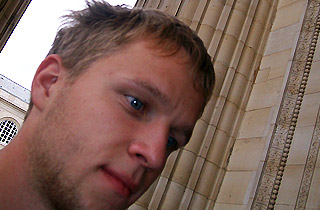| M100 | Board | Venue | Press | Partner/Links | Contact |
| Sanssouci Colloquium | |||
| Media Prize | |||
| Youth Media Workshop | |||
| Offshoot Workshop | |||
| Idea | |||
| 2005 | |||
| 2006 | |||
| 2007 | |||
| 2008 | |||
| 2009 | |||
| 2010 | |||
| Application Texts | |||
| Agenda | |||
| Participants | |||
| Workshops | |||
| Results |
The Integration has not succeeded, yet. My experiences with integration and the local print media. By Benjamin Bergemann Luckenwalde, district town of the Teltow-Fläming-region in Brandenburg, about 21,000 inhabitants. Or, in “official-ese: “A regional growth-core linked to the spacial and sectoral focus of federal funds to strengthen the growth forces.” The local newspaper functions like a mirror for Luckenwalde, its inhabitants, thus for the situation of integration in the town. If you open the paper, in other words look in said mirror, you can see the picture of a Märkisch province – articles about local events, local politics, local sports and local personalities. Just as expected of a local paper. The mirror function was given to it by definition. But in how far is it aware of the situation of people who are not local to Luckenwalde? First of all, it has to be remarked praisingly that the issue of migrant integration is featured in the newspaper. Only the mirror function in the light of integration leaves a lot left to desire. The result is that the group of migrants in Luckenwalde is split in two. Judged by the four stages of integration provided by modern sociology Luckenwalde’s asylum seekers already fail at the first hurdle of structural integration. “Migrants and their children are accepted as memebers of the host society, have access to societal positions and have equal opportunities within society. In order for this to happen the acquisition of language skills and knowledge about the rules of society that apply in the country of immigration are crucial.” Unfortunately, this is not the case in Luckenwalde. However, it is not a homemade problem of Luckenwalde but originates in immigration law. Especially the four-year-wait for a work permit makes integration near-impossible, as is critically analysed in the article for the 18th anniversary of the centre. A similar, if not more drastic problem is the language barrier that is a practically insurmountable obstacle to asylum seekers. This is also denounced in the article. Although the critisism of Luckenwalde’s role in this dilemma could be a bit more sound and objective it is evidently existant and might even prompt some readers’ concern. The paper therefore bears a big responsibility when it comes to integration. It acts as the point-of-first-encounter between asylum seekers and other inhabitants of Luckenwalde. Despite the fact that the encounter is not physical, it gives readers chance to find out more about those alien people that rarely appear in the townscape. The second group of migrants in Luckenwalde has already managed structural integration but fails when it comes to cultural integration in day-to-day-life. The members of this group that comprises mainly of Eastern European repatriates who have been living in Luckenwalde for years, are in command of the German language and their unemployment rate is not much different similar to the rest of Luckenwalde. Despite these facts they are invisible to societal live in the town. Luckenwalde’s doers, like town councillors, entrepreneurs, chairmen of clubs and even young people dedicated to good causes have no migration background. But those are exactely the people that fill pages of the newspaper that mirrors civil society, thus fails to represent the second group of migrants. Admittedly, it is difficult to identify and approach the problem “invisible migrants” in everyday-life of small-town-jounalism. It is not impossible however, once one has noticed the lack of a muticulturalism in Luckenwalde. Benjamin Bergeman is 19 years old and has just graduated from high school. Last summer he worked for the local news section Luckenwalde of the Märkische Allgemeine Zeitung. |
|
 |
||











